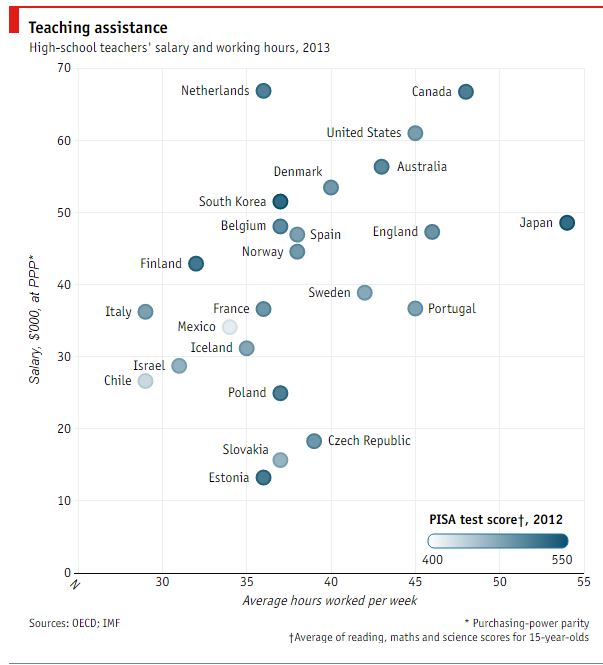Put to bed that meme about underpaid U.S. teachers
ridski said:
How much do middle school teachers make?
In NYC the pay rate is the same for elementary, middle and HS teachers.
Its the same contract where pay is based upon seniority and the teacher's education level (Bachelors, Bachelors + 30, Master's, Master + 30).
At the highest seniority and ed level a NYC teacher's base salary is about 135,000. Lowest is 51,000. Guidance counselors, assistant principals, principals get more.
How much does a Public School Teacher in Lexington, KY make? The median annual Public School Teacher salary in Lexington, KY is $50,030, as of March 24, 2016, with a range usually between $43,678-$57,768 not including bonus and benefit information and other factors that impact base pay. However, the salary for someone with the title Public School Teacher may vary depending on a number of factors including industry, company size, location, years of experience and level of education. Our team of Certified Compensation Professionals has analyzed survey data collected from thousands of HR departments at companies of all sizes and industries to present this range of annual salaries for people with the job title Public School Teacher in Lexington, KY.
Steve said:
not exactly http://teachnyc.net/your-career/salary-and-benefits
http://www.uft.org/files/attachments/secure/teacher-schedule-2009-2018.pdf
ridski said:
How much does a Public School Teacher in Lexington, KY make? The median annual Public School Teacher salary in Lexington, KY is $50,030, as of March 24, 2016, with a range usually between $43,678-$57,768 not including bonus and benefit information and other factors that impact base pay. However, the salary for someone with the title Public School Teacher may vary depending on a number of factors including industry, company size, location, years of experience and level of education. Our team of Certified Compensation Professionals has analyzed survey data collected from thousands of HR departments at companies of all sizes and industries to present this range of annual salaries for people with the job title Public School Teacher in Lexington, KY.
Jesus. I didn't know you had a team! I guess that's how you maintain your wit. ;-)
That graphic compares teachers from different countries. It does not demonstrate where teachers' salaries fall compared to other salaries in their country. "Underpaid" is a fairly economically regional comparative.
Also, many of those salaries are earned in different currencies, so I'm not clear how that was accounted for.
Did you really think this was meaningful or were you just being provocative?
So, what you're trying to say is that the Netherlands is the place to be a teacher, with the highest pay for just over 35 hours/week... all while achieving some top PISA scores?
compare apples to apples.
Public School teachers work 182 days a year. That is not counting very very generous sick leave which accumulates each year.
The typical corporate worker gets 10 paid holidays, 3 weeks vacation 3 personal days.
So the typical corporate worker works 232 days a year.
So, if a corporate worker earns $100,000 for 232 days work, that's $431 a day.
If a teacher earns $100,000 for 182 days work, that's $549 a day.
So a teacher earning $100,000 makes the same per day as a corporate worker making $127,000
Yes, I know teachers take work home, but so do most other people too.
And teachers can retire at 55 and have very generous pensions - which is very uncommon in the corporate world.
I am not saying teachers are over paid or under paid. But looking at a teacher's salary and comparing it to any other salary without taking into account the enormous number of days off is not fair.
Also, teachers have job security that is unheard of anywhere else except civil service.
If teachers really were underpaid, then school districts would have a hard time filling positions. The fact that trained licensed professionals are willing to take substitute gigs for $75 a day just to get a foot in the door for a teaching job tells me that may not be the case
I've taught for 25 years and salaries, especially starting salaries, are definitely more competitive now. One issue is that increases are small and, depending on the district salary guide, it can take decades to reach salary levels that are considered "middle class" in our region of the U.S. In our region a teacher trying to support a family on $60,000 has to coach and tutor during the school year and work all summer to make ends meet.
The other issue is do we pay teachers enough to recruit our "best and brightest" students? Consider how teachers are treated in the media, by politicians, etc. Who would want to go into teaching if they can make at least twice as much in a job where they aren't blamed for the downfall of US civilization and can go to the bathroom whenever they want (within reason)? Another highly criticized group that does not work 12 months per year are NFL referees - they make an average of $173,000.
I love my job and feel that I am reasonably well compensated, but I don't have kids to put through college.
sarahzm said:
compare apples to apples.
Public School teachers work 182 days a year. That is not counting very very generous sick leave which accumulates each year.
The typical corporate worker gets 10 paid holidays, 3 weeks vacation 3 personal days.
So the typical corporate worker works 232 days a year.
So, if a corporate worker earns $100,000 for 232 days work, that's $431 a day.
If a teacher earns $100,000 for 182 days work, that's $549 a day.
So a teacher earning $100,000 makes the same per day as a corporate worker making $127,000
Yes, I know teachers take work home, but so do most other people too.
And teachers can retire at 55 and have very generous pensions - which is very uncommon in the corporate world.
I am not saying teachers are over paid or under paid. But looking at a teacher's salary and comparing it to any other salary without taking into account the enormous number of days off is not fair.
Also, teachers have job security that is unheard of anywhere else except civil service.
If teachers really were underpaid, then school districts would have a hard time filling positions. The fact that trained licensed professionals are willing to take substitute gigs for $75 a day just to get a foot in the door for a teaching job tells me that may not be the case
And this sort of attitude, with its not so subtle denigration of teaching as a profession and career, dissuades talented people from the profession of teaching every day. Because, you know, how can you take seriously anyone who has summers off.
bramzzoinks said:
Third highest in the OECD at purchasing power parity.
As far as I can tell, here is where the United States ranks among those countries in per capita GDP, using purchasing power parity: Third. So the third-highest teacher salaries on the chart were in the third-wealthiest country on the chart. Go figure.
Another thing the Organization for Economic Cooperation and Development says about teachers in America: At the high school level, in 2012 they were paid 70 percent of the typical salary for college-educated workers in their country. (A bargain even under sarahzm's "not saying they're overpaid" days-worked math.) The OECD average was 92 percent.
http://www.oecd.org/edu/EAG2014-Indicator%20D3%20(eng).pdf
It's such a cushy job, though, you can see why college graduates are flocking to the field and keeping those licensed subs scrambling for full-time work.
On that note, a sincere thank you, EBennett, for sticking with it all these years.
jersey_boy said:
Did you really think this was meaningful or were you just being provocative?
Zoinks? Criticizing public union people? Nah. He just wanted to clarify.
I raised two kids on a teacher salary. Painted houses/taught summer session/etc. just for the heck of it.
It got boring lounging around the house all summer and on holidays.
Who's responsible for 180-day schedule? Not teachers. Worked in an affluent burb where parents freaked out over potential loss of February break.
max_weisenfeld said:
sarahzm said:
compare apples to apples.
Public School teachers work 182 days a year. That is not counting very very generous sick leave which accumulates each year.
The typical corporate worker gets 10 paid holidays, 3 weeks vacation 3 personal days.
So the typical corporate worker works 232 days a year.
So, if a corporate worker earns $100,000 for 232 days work, that's $431 a day.
If a teacher earns $100,000 for 182 days work, that's $549 a day.
So a teacher earning $100,000 makes the same per day as a corporate worker making $127,000
Yes, I know teachers take work home, but so do most other people too.
And teachers can retire at 55 and have very generous pensions - which is very uncommon in the corporate world.
I am not saying teachers are over paid or under paid. But looking at a teacher's salary and comparing it to any other salary without taking into account the enormous number of days off is not fair.
Also, teachers have job security that is unheard of anywhere else except civil service.
If teachers really were underpaid, then school districts would have a hard time filling positions. The fact that trained licensed professionals are willing to take substitute gigs for $75 a day just to get a foot in the door for a teaching job tells me that may not be the case
And this sort of attitude, with its not so subtle denigration of teaching as a profession and career, dissuades talented people from the profession of teaching every day. Because, you know, how can you take seriously anyone who has summers off.
Where in my post is there even a subtle denigration of teachers. If there is it was not intended. I thought My post was limited to comparing the days worked and benefits of teaching vs the corporate world. Bringing up the fact that teachers report to work 10 weeks less a year than the average corporate worker in a discussion about pay and benefits is just a statement of relevant fact. I do not denigrate teachers. My own mother was a teacher. I think she was underpaid.
My premise is simply that when evaluating compensation you should look at the whole picture.
Additionally, My problem with the current system is that hardworking dedicated teachers are rewarded/compensated no differently than those just clocking it in. I wish there were more rewards for the many great teachers and ways to eliminate those not doing their jobs.
GL2 said:
Who's responsible for 180-day schedule? Not teachers. Worked in an affluent burb where parents freaked out over potential loss of February break.
Teachers union. Ask any parent if they would be open to children spending more days in school and then just try inserting extra work days in a contract negotiation.
personally, I would have been against more days of school unless it was accompanied by a strict "no homework" policy. Looking back on my kids' elementary school days, homework was the bane of our existence. I still have PTSD regarding the term "night write."
sarahzm, sorry but you're really really wrong. Unless you're blindly crying "Unions!," you've been misinformed.
Most teachers would gladly work year-round rather than take up summer jobs.
Of course, your "inserting extra work days" must translate into 2 months more pay.
ml1 said:
personally, I would have been against more days of school unless it was accompanied by a strict "no homework" policy. Looking back on my kids' elementary school days, homework was the bane of our existence. I still have PTSD regarding the term "night write."
Yup, if any group is being clobbered by America's "perceived" education failures, it's kids who are being bombarded with more HW. More of the same ain't "more." It may be less.
And, of course, in any of these recurring school/teacher threads, no one explains the great success of affluent districts.
Also, i see "England" on that graph, but it doesn't tell me where Scotland falls.
GL2 said:
ml1 said:
personally, I would have been against more days of school unless it was accompanied by a strict "no homework" policy. Looking back on my kids' elementary school days, homework was the bane of our existence. I still have PTSD regarding the term "night write."
Yup, if any group is being clobbered by America's "perceived" education failures, it's kids who are being bombarded with more HW. More of the same ain't "more." It may be less.
I blame parents for this. I recall going to parties when my kids were young and hearing other parents complain that their kids' teachers weren't assigning "enough" homework. I'd nod politely but inside I'd be thinking "are you freakin' kidding me! The LAST thing my kid needs is more homework."
ridski said:
Also, i see "England" on that graph, but it doesn't tell me where Scotland falls.
Being that the chart is from the Economist I am sure that "England" really does mean England and is not a misnomer for Great Britain. Scotland does have autonomy in education, as in many things.
The real issue should be - Why do CEO's get paid so much even when they fail at their jobs?
and if teachers have great benefits and pensions, I want the same thing for everyone. Most teachers I know work even on "days off". They usually have to be at school a week before classes begin, and it is not just taking work home. I have seen teachers work thru the night to make sure they finish reading and grading every report no matter how boring it might get. Just not as simple as saying they work 182 days and so what if they take work home because so do a lot of people.
We should want the best teachers for our kids and their pay should be competitive with the highest paid professionals.
Most NFL referees have regular full-time jobs. Refereeing is a side job (a well-paid side job).
EBennett said:
I've taught for 25 years and salaries, especially starting salaries, are definitely more competitive now. One issue is that increases are small and, depending on the district salary guide, it can take decades to reach salary levels that are considered "middle class" in our region of the U.S. In our region a teacher trying to support a family on $60,000 has to coach and tutor during the school year and work all summer to make ends meet.
The other issue is do we pay teachers enough to recruit our "best and brightest" students? Consider how teachers are treated in the media, by politicians, etc. Who would want to go into teaching if they can make at least twice as much in a job where they aren't blamed for the downfall of US civilization and can go to the bathroom whenever they want (within reason)? Another highly criticized group that does not work 12 months per year are NFL referees - they make an average of $173,000.
I love my job and feel that I am reasonably well compensated, but I don't have kids to put through college.
bramzzoinks said:
ridski said:
Also, i see "England" on that graph, but it doesn't tell me where Scotland falls.
Being that the chart is from the Economist I am sure that "England" really does mean England and is not a misnomer for Great Britain. Scotland does have autonomy in education, as in many things.
I know. I'm wondering why Scotland, as it has a better education system than England, isn't mentioned.
Featured Events
-
Go "Back to the '70s" with The Maplewood Glee Club and Special Guests from CHS
May 19, 2024 at 4:00pm
Sponsored Business
Promote your business here - Businesses get highlighted throughout the site and you can add a deal.






































Third highest in the OECD at purchasing power parity.
http://www.economist.com/blogs/graphicdetail/2016/04/daily-chart-18